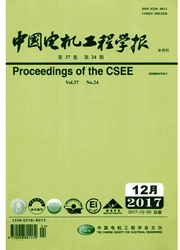

 中文摘要:
中文摘要:
多功能并网逆变器(multi-functional grid-tied inverter,MFGTI)在实现可再生能源并网的同时,复合了电能质量治理功能的并网逆变器,在微电网和分布式发电系统中具有重要的应用前景。该文针对并网微网中的谐波和无功电流等电能质量问题,研究多台MFGTI之间无互联通信线的协调控制策略,基于谐波和无功负荷容量下垂的思想提出了一种有效的协调控制方案。每台MFGTI根据设定的"并网点处无功和谐波负荷电流的视在容量"与"补偿比例系数"之间的下垂特性,实现并网微网中无功和谐波负荷电流在多台MFGTI之间的分摊。因此,每台MFGTI只需采集本地的电气信息,即可根据自身所能提供的补偿容量,独立、自治地参与微网电能质量的治理,不需要额外的互联通信线。此外,为了降低控制器的计算负担,提出了一种简化的计算方法,以有效识别负荷电流中待补偿分量的视在容量,并进行了详细分析和验证。最后,在一个并网微网实验平台上,利用两台10 k VA的MFGTI验证了所提控制策略在分布式电源并网和并网微电网电能质量治理中的正确性和有效性。
 英文摘要:
英文摘要:
Multi-functional grid-tied inverters (MFGTIs) are grid-tied inverters, which integrate renewable energy sources into utilities and provide auxiliary services to enhance the power quality of grid-connected micro-grids. To coordinate the multiple MFGTIs in a grid-connected micro-grid to share and to compensate the harmonics and reactive load currents without communication wires, a droop-based control scheme is presented. Each MFGTI detects the harmonic and reactive issues at its terminal, and partly enhances the power quality according to its available capacity margin and the proposed droop scheme. Besides, in order to reduce the burden of the controller on computation, a simplified approach is presented to calculate the capacity of harmonics and reactive load currents. An MFGTI just senses its terminal electrical information, and no extra communication wire is required. As a result, each MFGTI can independently and autonomously enhance the power quality of a grid-connected micro-grid. Finally, the experimental results performed on a micro-grid feeder verified the validity and effectiveness of the presented coordinated control strategy to enhance the power quality issues of grid-connected micro-grids by means of MFGTIs.
 同期刊论文项目
同期刊论文项目
 同项目期刊论文
同项目期刊论文
 期刊信息
期刊信息
